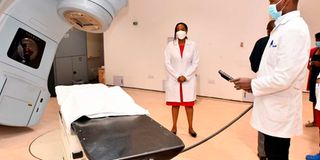Evolution of cancer treatment in Kenya and East Africa

What you need to know:
- A diagnosis of cancer is often, but not certainly, followed by surgery, radiotherapy, and chemotherapy depending on the type of disease an individual is diagnosed with.
- Today, scientific discoveries have given rise to more drugs known as immunotherapies, a type of treatment that helps the immune system fight the disease, and targeted therapies.
Landmark discoveries in the past 30 years in cancer prevention, screening, and treatment have changed the prognosis of the once incurable disease. Recent decades have witnessed a remarkable improvement in many aspects of oncology from better understanding the causes, both lifestyle and biological, and enormous progress in developing more effective treatments for many forms of cancer.
A diagnosis of cancer is often, but not certainly, followed by surgery, radiotherapy, and chemotherapy depending on the type of disease an individual is diagnosed with. Today, scientific discoveries have given rise to more drugs known as immunotherapies, a type of treatment that helps the immune system fight the disease, and targeted therapies, which are designed to block the specific genes and proteins driving cancer growth.
According to the latest cancer statistics, Globocan 2020, breast cancer remains the leading type of cancer in women in Kenya, East Africa, and the world over. Kenya recorded 42,116 cases of cancer and 27,092 deaths in that year. Breast (16.1 per cent), cervical (12.4 per cent), prostate (8.1 per cent), oesophagus (7.1 per cent), and colorectum (6.5 per cent) are currently the leading types of cancer in the country, prompting researchers to race against time to develop advanced therapies to treat these diseases.
“The field of oncology is advancing at a very rapid pace with therapies for early-stage or late-stage treatment of cancer. It is a good moment to say that for all patients there are treatments that would improve their quality of life. We have improved our diagnosis, radiology, and training,” said Dr Sitna Mwanzi, an oncologist.
Prof Asim Jamal Shaikh, a medical oncologist and associate professor at the Aga Khan University, noted that cancer management has moved from a point where “we used to give chemotherapy for all types of breast cancers.”
Another game-changer in cancer management, he noted, is the stage of presentation. Even so, seven out of ten cancer patients are still diagnosed at a late stage of the disease. “If you present early, your survival goes up by 70 to 90 per cent compared to late presentation,” said Prof Asim on the sidelines of the Beacon International Cancer Summit held in Zanzibar in December. The conference, which brought together oncologists from eight African countries, highlighted the importance of diversifying treatment in the era of advanced therapeutics.
“When deciding on the mode of treatment for patients we often look at the type of breast cancer and patient’s clinical status like whether they have other medical conditions, how fit they are to receive the therapies being prescribed,” explained Dr Mwanzi.
Across the East African region, governments and the private sector have been in a race to introduce cutting-edge technologies to manage the rising cases.
In Tanzania, Muhimbili National Hospital last month started conducting bone marrow transplants for cancer patients. This made Tanzania the seventh country (after Morocco, Algeria, Tunisia, Egypt, Nigeria, and South Africa) with the capacity to perform a bone marrow transplant also called a stem cell transplant or, more specifically, a hematopoietic stem cell transplant. This type of transplantation can be used to treat certain types of cancer, such as leukaemia, myeloma, lymphoma, and other blood and immune system diseases that affect the bone marrow.
In Kenya, Kenyatta University Teaching, Referral, and Research Hospital (KUTRRH) in October last year launched a sophisticated integrated molecular imaging centre (IMIC), a first of its kind in the East African region, to offer both diagnostic and therapeutic services for the management of cancer and other diseases. In the same month, Kenya launched the first national palliative care policy to help accelerate the provision of the key service in the country.
While progress in oncology has been remarkable in recent decades, existing disparities at many levels of society is such that not every cancer patient has access to these modern advances. For this reason, Beacon Pharmaceuticals Limited, a Bangladeshi-owned pharmaceutical recently launched four new generic cancer immunotherapy drugs in the African continent for the treatment of melanoma, head and neck cancer, Hodgkin lymphoma, and stomach cancer.
A lot of the newer immunotherapies and targeted therapies are initially expensive but generics, biosimilars, and economies of scale will see the cost of these treatments lower.
“We want African patients to have access to treatments that are available in other countries at affordable prices,” said Shahariar Tamal Selim, the vice president at the company.





